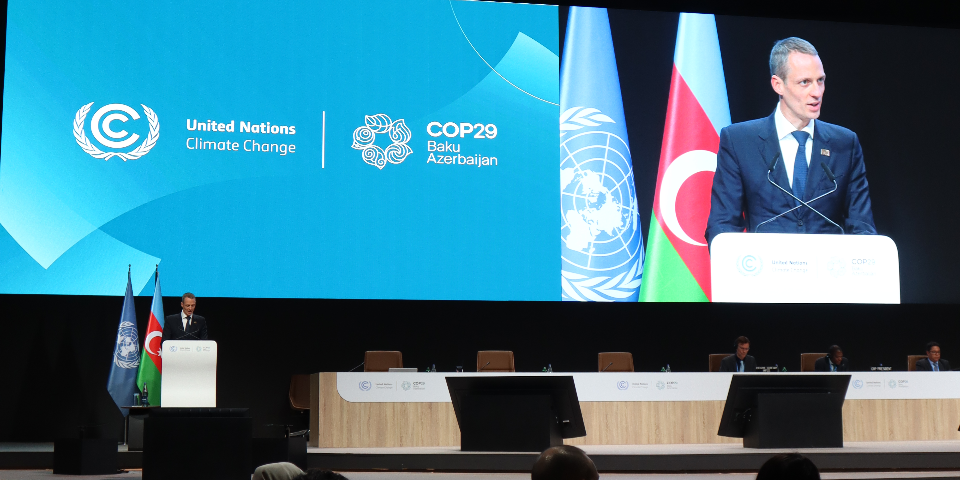
Agreement on new climate finance target at COP29 in Baku
The 29th United Nations Climate Change Conference (COP29) took place in Baku, Azerbaijan, from 11 to 24 November 2024.
At the end of difficult and laborious negotiations, the 195 Parties to the Paris Climate Agreement, including the Luxembourg delegation led by the Minister for the Environment, Climate and Biodiversity Serge Wilmes, succeeded in adopting an agreement on the New Collective Quantified Climate Finance Target (NCQG). This will provide $300 billion a year between now and 2035 to support developing countries in their efforts to mitigate, adapt to and mitigate loss and damage from climate change. This new target represents a substantial increase on the $115.9 billion that developed countries provided and mobilised in 2022, according to figures compiled by the OECD.
Minister Serge Wilmes emphasised that "the agreement on the NCQG at COP29 in Baku marked the start of a new era for international climate financing. Not only have the developed countries tripled their commitments by 2035, they have also succeeded in inviting other countries such as China and the Gulf Arab States to contribute to these same efforts. In Baku, the united European Union took its leadership role in bringing together many developing countries around a common project to make this agreement possible."
Unfortunately, however, COP29 was unable to reach a conclusion on the follow-up to decisions on global emissions reductions and the phasing out of fossil fuels. Without a decision on these points, discussions on efforts to limit global warming to 1.5 degrees will continue next year.
Together, the Dubai Consensus and the Baku NCQG provide a solid basis for the signatory countries of the Paris Agreement to submit new and sufficiently ambitious "national contributions" before COP30, to be held next year in Brazil.
COP29 also adopted a series of decisions concerning Article 6 of the Paris Agreement on carbon markets. This authorises, standardises and makes transparent the global trading of carbon credits, thereby finalising a central aspect of the implementation of the Paris Agreement.
During the national address, Minister Serge Wilmes announced Luxembourg's new "international climate finance" envelope of 320 million euros for the period 2026-2030, adopted by the Government Council on 15 November. This is a significant and generous increase, confirming Luxembourg's international commitment to the fight against climate change and affirming its leadership at a crucial time in the negotiations on the new collective quantified target.
Alongside the negotiation process for the United Nations Framework Convention on Climate Change (UNFCCC), the Luxembourg delegation also met several international partners as part of bilateral exchanges, provided support to young Luxembourg participants and followed a programme of conferences at the representative pavilion shared by the Benelux countries and the European Investment Bank (EIB).
For the first time this year, two young Luxembourg climate delegates, Natasha Lepage and Frida Thorsteinsdottir, were part of the Luxembourg delegation. They took part in a specific programme dedicated to young negotiators, advised the members of the delegation on young people's climate priorities and played an active part in the negotiations.
Luxembourg has invited to two side events as part of the Global Shield, an initiative that aims to strengthen the position of developing countries vulnerable to climate change and improve their financial protection to prevent, minimise and address loss and damage caused by the adverse effects of climate change. Luxembourg has so far contributed 5.5 million euros to the Global Shield, including 2.5 million euros to the Global Shield Financing Facility.
In addition, the first four projects from the Resilient Landscapes Luxembourg incubator, launched in collaboration with CIFOR-ICRAF and aimed at mobilising high-impact private capital for nature-based solutions, were presented.
Press release from the Ministry of the Environment, Climate and Biodiversity
Find out more
